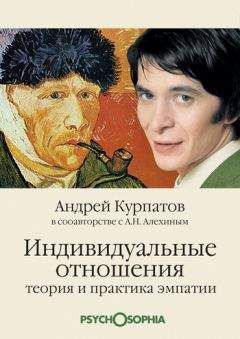Карл Роджерс - Клиентоцентрированная терапия

Скачивание начинается... Если скачивание не началось автоматически, пожалуйста нажмите на эту ссылку.
Жалоба
Напишите нам, и мы в срочном порядке примем меры.
Описание книги "Клиентоцентрированная терапия"
Описание и краткое содержание "Клиентоцентрированная терапия" читать бесплатно онлайн.
В книге изложена теория личности К. Роджерса как основание разработанного им психотерапевтического подхода — клиентоцентрированной терапии.
Прикладные аспекты данного метода представлены в главах, написанных сподвижниками К. Роджерса — Э. Дорфман (Игровая терапия), Н. Хоббсом (Группоцентрированная терапия) и Т. Гордоном (Вопросы лидерства и управленческого администрирования).
"Тот факт, что ... изменения должны навязываться индивиду извне, представляется настолько очевидной необходимостью, что часто воспринимается как должное. Многие люди считают, что создание неформальной атмосферы, атмосферы свободы выбора, как составляющих процесса перестройки, означает не что иное, как то, что руководитель, обеспечивающий процесс этой перестройки, должен быть достаточно умен, чтобы, ма
нипулируя субъектами, внушить им мысль о том, что это они сами управляют всем происходящим. Такие люди считают, что подобный подход является простой маскировкой того, что, по их мнению, было бы более честным, то есть прямых методов применения силы. Однако следует заметить, что если под перестройкой понимается создание некоего супер-эго, то из этого неизбежно следует, что эта цель не будет достигнута, пока совершенно новые ценности не будут приняты группой, в результате их свободного выбора" (50, с. 61).
Это факт огромного значения. Если мы согласимся с таким утверждением, это будет означать необходимость перестройки большинства существующих концепций управления и администрирования. Лидер группы, который видит свою основную задачу в том, чтобы обеспечить группе такие условия, при которых члены группы самостоятельно смогли бы вырабатывать решения, выполняет совершенно другую роль, нежели лидер, который прилагает основные усилия к тому, чтобы обеспечить наиболее эффективный способ доведения собственных решений до членов группы, и который должен постоянно поддерживать мотивацию группы на выполнение этих решений.
В заключение, можно сказать, что все выводы, все то, что мы осмелились представить в качестве результатов, которых можно ожидать от применения группоцентрированного лидерства, основано на очень небольшом практическом материале и часто непроверенных данных. Тем не менее, эти начинания оказали на нас огромное влияние, и мы не могли не почувствовать, что социальная наука на этом пути может достигнуть более полного понимания демократии. Эта демократия будет означать более активное, живое участие простых людей во всех касающихся их вопросах. Это будет означать возможность самореализации каждого члена группы, возможность максимального использования потенциала каждой группы.
Библиография
1. Allien, F. H. Psychotherapy with Children. New York: W. W. Norton, 1942.
2. Allport, G. W. The psychology of participation. Psychol. Rev., 1945, 53,
117-132. [Permission to quote given by the Psychological Review and the American Psychological Association.]
3. Alpert, В., and P. A. Smith. How participation works. /. Social Issues,
1949, 5, 3-13.
4. Anderson, H. H., and H. M. Brewer. Studies of teachers' classroom
personalities: I. Dominative and socially integrative behavior of kindergarten teachers. App. Psychol. Monogr., 1945, No. 6, 157 pp.
5. Angyal, A. Foundations for a Science of Personality. New York: Com-
monwealth Fund, 1941.
6. Axline, Virginia M. Nondirective therapy for poor readers. /. Consult.
Psychol., 1947, 11, 61-69.
Axline, Virginia M. Play Therapy. Boston: Houghton Mifflin, 1947.
Baldwin, A. L.; Joan Kalhorn, and F. H. Breese. Patterns of parent behavior. Psychol. Monogr., No. 268, 1945, 58, No. 3, 1-75.
Benne, K. D., and Paul Sheats. Functional roles of group members. /. Social Issues, 1948, 4, 41-49.
Bills, Robert E. Nondirective play therapy with retarded readers. J. Consult. Psychol., 1950, 14, 140-149.
Bills, Robert E. Play therapy with well-adjusted retarded readers. /. Consult. Psychol, (in process of publication).
Bills, Robert E.; C. J. Leiman, and R. W. Thomas. A study of the validity of the TAT and a set of animal pictures. 1949. (To be published.)
Bion, W. R. Experiences in groups: I. Human Relations, 1948, 1, 314-320.
Bixler, Ray H. Limits are therapy. /. Consult. Psychol., 1949, 13, 1-11.
Blocksma, D. D. An experiment in counselor learning. Ph.D. thesis in progress, University of Chicago.
Burrow, Trigant. The Neurosis of Man. New York: Harcourt, Brace, 1949.
Cameron, Norman. The Psychology of Behavior Disorders. New York: Houghton Mifflin, 1947.
Coch, Lester, and J.R.P. French, Jr. Overcoming resistance to change. Human Relations, 1948, 1, 512-532.
Cowen, E. L., and W. M. Cmickshank. Group therapy with physically handicapped children: II. Evaluation. /. Educ. Psychol, 1948,39,281-297.
Cruickshank, W. M., and E. L. Cowen. Group therapy with physically handicapped children: I. Report of study. /. Educ. Psychol, 1948, 39, 193-215.
Doll, Edgar A. Vineland Social Maturity Scale. Educ. Test Bureau, Educ. Test Publishers, Minneapolis, 1947.
Finke, Helene. Changes in the expression of emotionalized attitudes in six cases of play therapy. M.A. thesis, University of Chicago, 1947.
Fleming, Louise, and W. U. Snyder. Social and personal changes following non-directive group play therapy. Amer. J. Orthopsychiat.,
mi, 17, 101-116.
French, J. R. P., Jr.; A. Kornhauser; and A. Marrow, editors. Conflict and cooperation in industry. J. Social Issues, 1946, 2, 1-54.
Freud, Anna. Introduction to the Technic of Child Analysis. New York: Nervous and Mental Disease Publishing Co., 1928.
Freud, Sigmund. Group Psychology and the Analysis of the Ego. London: Hogarth Press, 1948. (Published in the United States by Live-right Publishing Corporation.)
Golden, C. S., and H. J. Ruttenbeig. The Dynamics of Industrial Democracy. New York: Harper and Bros., 1942.
Golden, C. S., and H. J. Ruttenbeig. Labor and management responsibility for production efficiency. In Т. M. Newcomb, and E. L. Hartley, Reading? in Social Psychology. New York: Henry Holt, 1947, 461-465. (Reprinted from The Dynamics of Industrial Democracy. New York: Harper and Bros., 1942.)
Goldstein, Kurt. Human Nature in the Light of Psychopathology. Cambridge: Harvard University Press, 1940.
Gordon, Thomas. What is gained by group participation. Educ. Leadership, 1950, 7, 220-226.
Gorlow, Leon. Nondirective group psychotherapy: an analysis of the behavior of members as therapists. Ph.D. thesis. Teachers College, Columbia University, 1950.
Haigh, Gerard, and Bill L. Kell. Multiple therapy as a method for training and research in psychotherapy. /. Abnorm. & Soc. Psychol (accepted for publication).
Hobbs, Nicholas. Nondirective group therapy. /. Natl Assn. of Deans of Women, 1949, 12, 114-121.
Hoch, Erasmus L. The nature of the group process in non-directive group psychotherapy. Ph.D. thesis. Teachers College, Columbia University, 1950.
Hogan, Richard. The development of a measure of client defensive-ness in a counseling relationship. Ph.D. thesis, University ot Chicago, 1948.
Hogan, Richard. The development of a measure of client defensive-ness in the counseling relationship. Ph.D. thesis abstract, University of Chicago, 1948.
Homey, Karen. Self Analysis. New York: W.W. Norton, 1942.
Hunt, J. McV. Personality and the Behavior Disorders. 2 vols. New York: Ronald Press, 1944.
Ichheiser, Gustav. Misunderstandings in Human Relations. Chicago: University of Chicago Press, 1949.
Jaques, Elliott. Interpretive group discussion as a method of facilitating social change. Human Relations, 1948, 1, 533-549.
Jaques, Elliott, ed. Social therapy. / Social Issues, 1947, 3, 67 pp.
Jaques, Elliott. Some principles of organization of a social therapeutic institution. J. Social Issues, 1947, 3, 4-10.
Klein, Melanie. The Psycho-analysis of Children, London: Hogarth Press, 1937.
Kluckhohn, Clyde, and H. A. Murray, editors. Personality in Nature, Society and Culture. New York: Knoff, 1948.
Krech, David, and R. S. Crutchfield. Theory and Problems of Social Psychology. New York: McGraw-Hill, 1948.
Landisberg, Selma, and W. U. Snyder. Non-directive play therapy. J. Clin. Psychol., 1946, 2, 203-213.
Lecky, Prescott. Self-Consistency: a Theory of Personality. New York: Island Press, 1945.
Leeper, Robert W. A motivational theoiy of emotion to replace "emotion as disorganized response." Psychol. Rev., 1948, 55, 5-21.
Leeper, Robert W. Cognitive and symbolic processes. Unpublished manuscript.
Lewin, Kurt, and Paul Grabbe. Conduct, knowledge and acceptance of new values. /. Social Issues, 1945, 1, 53-64.
Lippitt, Ronald, and R. K. White. The "social climate" of children's groups. Chapter XXVIII in R. Barker, J. Kounin, and H. Wright. Child Development and Behavior. New York: McGraw-Hill, 1943.
McCleary, R. A., and R. S. Lazarus. Autonomic discrimination without awareness. /. Pers., 1949, 18, 171-179.
McGinnies, Elliott. Emotionality and perceptual defense. Psychol. Rev., 1949, 56, 244-451.
McGregor, Douglas. Conditions of effective leadership in the industrial organization. In Т. M. Newcomb, and E. L. Hartley, Readings in Social Psychology. New York: Henry Holt, 1947, 427-435. (Reprinted from /. Consult: Psychol. 1944, 8, 55-63.)
Maslow, A. H. Dymanics of personality organization. Psychol. Rev., 1943, 50, 514-539, 541-558.
Maslow, A. H. A theory of human motivation. Psychol. Rev., 1943, 50, 370-396.
Masserman, J. H. Principles of Dynamic Psychiatry. New York: Saunders, 1946.
Mayo, Elton. The Social Problems of an Industrial Civilization. Boston: Division of Research, Harvard University Graduate School of Business Administration, 1945.
Mowrer, О. H., and Clyde Kluckhohn. A dynamic theory of personality. Chapter III in J. McV. Hunt, Personality and the Behavior Disorders, vol. 1. New York: Ronald Press, 1944.
Murphy, Gardner. Personality: a Biosocial Approach to Origins and Structure. New York: Harper and Bros., 1947.
Newcomb, Т. M. Autistic hostility and social reality. Human Relations, 1947, 1, 69-86.
Pearse, I. H., and Lucy H. Crocker. The Peckham Experiment: a Study in the Living Structure of Society. London: George Alien and Unwin, Ltd., 1943.
Peres, H. An investigation of nondirective group therapy. /. Consult. Psychol, mi, 11, 159-172.
Porter, E. H., Jr. An Introduction to Therapeutic Counseling. Boston: Houghton Mifflin, 1950.
Postman, L.; J. S. Bruner, and E. McGinnies. Personal values as selective factors in perception. /. Abnorm. & Soc. Psychol, 1948, 43, 142-154.
Radke, Marian, and Dayria Klisurich. Experiments in changing food habits. /. Amer. Dietetic Assn., 1947, 23, 403-409.
Rank, Otto. Will Therapy; and Truth and Reality. New York: Knopf, 1945.
Recommended graduate training program in clinical psychology. Report of the Committee on Training in Clinical Psychology of the American Psychological Association, Amer. Psychologist, mi, 2, 539-558.
Reik, Theodor. Listening with the Third Ear. New York: Farrar, Straus, 1948.
Ribble, Margaret A. Infantile experience in relation to personality development. Chapter XX in J. McV. Hunt, Personality and the Behavior Disorders, vol. 2. New York: Ronald Press, 1944.
Roethlisberger, F. J., and W. J. Dickson. Management and the Worker. Cambridge: Harvard University Press, 1939.
Rogers, Carl R. Counseling and Psychotherapy. Boston: Houghton Mifflin, 1942.
Rogers, Carl R. Divergent trends in methods of improving adjustment. Harvard Educ.Rev., 1948, 209-219.
Rogers, Carl R. Some implications of client-centered counseling for college personnel work. Educ. & Psychol Measmt, 1948, 8, 540-549.
Rogers, Carl R. The use of electrically recorded interviews in improving psychotherapeutic techniques. Amer, J. Orthopsychiat., 1942,12,429-434.
Seeman, Julius. A study of the process of nondirective therapy. /. Consult. Psychol, 1949, 13, 157-168.
Shedlin, Arthur J. The Effectiveness of Group Climate: an Experiment in Human Relations. National Conference of Christians and Jews, Inc., 1948.
Sheerer, Elizabeth T. An analysis of the relationship between acceptance of and respect for self and acceptance of an respect for others in seven counseling cases. Ph.D. thesis, University of Chicago, 1949.
Sheerer, Elizabeth T. An analysis of the relationship between acceptance of and respect for self and acceptance of and respect for others in ten counseling cases. /. Consult. Psychol, 1949, 13, 169-175.
Snyder, W. U., et al. Casebook of Non-directive Counseling. Boston: Houghton Mifflin, 1947.
Snygg, Donald, and Arthur W. Combs. Individual Behavior: a New Frame of Reference for Psychology. New York: Harper and Bros., 1949.
Stephenson, W. Introduction to inverted factor analysis, with some applications to studies in orexis. /. Educ. Psychol, 1936, 27, 353-367.
Stephenson,W. Methodological consideration of Jung's typology. /. Ment. Scl, 1939, 85, 195-205.
Sullivan, H. S. Conceptions of Modern Psychiatry. Washington, D.C.: W. A. White Foundation, 1945.
Survey Research Center Study No. 6. Selected findings from a study of clerical workers in the Prudential insurance company of America. Human Relations, University of Michigan, 1948.
Taft, Jessie. The Dynamics of Therapy in a Controlled Relationship. New York: Macmillan, 1933.
Tavistock Institute of Human Relations. Two research projects on human relations in industry. Document No. 173, January 1949.
Telschow, Earl. The role of the group leader in nondirective group psychotherapy. Ed. D. project, Teachers College, Columbia University, 1950.
Thelen, H. A., and John Withall. Three frames of reference: the description of climate. Human Relations, 1949, 2, 159-176.
Travis, L., and D. Baruch. Personal Problems of Everyday Living. New York: Appleton-Century, 1941.
Whitaker, Carl. Teaching the practicing physician to do psychotherapy. Southern Med. J., 1949, 42, 809-903.
Whitaker, C. A.; J. Warkentin, and N. Johnson. A philosophical basis for brief psychotherapy. Psychiatric Quarterly, 1949, 23, 439-443.
Подписывайтесь на наши страницы в социальных сетях.
Будьте в курсе последних книжных новинок, комментируйте, обсуждайте. Мы ждём Вас!
Похожие книги на "Клиентоцентрированная терапия"
Книги похожие на "Клиентоцентрированная терапия" читать онлайн или скачать бесплатно полные версии.
Мы рекомендуем Вам зарегистрироваться либо войти на сайт под своим именем.
Отзывы о "Карл Роджерс - Клиентоцентрированная терапия"
Отзывы читателей о книге "Клиентоцентрированная терапия", комментарии и мнения людей о произведении.





















